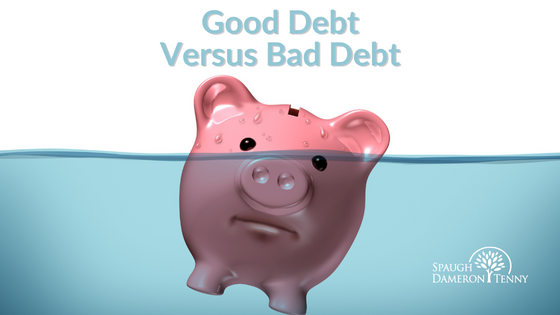There’s no question that the economy is confusing right now. On the one hand, unemployment is low, earnings are up, and our homes are worth more than ever. However, on the other hand, everything costs more, the stock market seems wobbly, and the interest rate on loans is no fun.
So, what are we to do?

For those of you working diligently to improve your economy in the midst of all the uncertainty, take a minute to assess your debt. Ask yourself if your debt is “good debt” or “bad debt.”
Many people believe that having no debt is the way to go. But in many cases, debt may actually be considered good for your finances if it helps you build wealth. Still, it is crucial to note that many other kinds of debt are unhealthy for your finances.
Think about it like this. If the debt you take on increases your net worth or generates future income, then it can be considered “good.” Ideally, it should be in low amounts, low cost, help you achieve financial goals, and have potential tax advantages.
Some examples of expenses that can help you build long-term wealth include:
When you borrow money to purchase a depreciating asset, that is generally considered bad debt. Simply put, “bad debt” is the debt you are not able to pay.
For example, auto loans, credit card debt, and personal loans to banks are generally considered bad debt. This is because the interest rates are higher and any collateral (e.g., your car) is likely to depreciate. As much as possible, try to minimize or altogether avoid high-cost debt that isn’t tax-deductible.
For instance, you may want to avoid debt for:
There are several reasons why it can be beneficial to focus on paying down bad debt in an uncertain economy:
Bad debt, such as high-interest loans or excessive credit card debt, can significantly burden your cash flow.
In an uncertain economy, where job security and income stability may be compromised, reducing or eliminating bad debt helps maintain financial stability. It can also give you more flexibility to manage expenses and minimizes the risk of financial hardship if there is a change in your income or bonuses.
High levels of bad debt can also lead to increased financial stress, affecting your mental and emotional well-being. If you’re already feeling heightened anxiety about your financial future, getting rid of bad debt may alleviate some of this stress, enabling you to focus on other important aspects of life.
Eliminating bad debt provides greater financial flexibility and freedom. It frees up income that would otherwise be spent on interest payments or debt servicing, allowing you to redirect those funds toward savings, investments, or essential expenses.
This increased flexibility can help navigate an uncertain economy by providing a buffer against unforeseen circumstances or emergencies.
Bad debt can negatively impact your credit score, making it challenging to secure favorable terms for other loans or credit. By eliminating bad debt, you can improve your credit score and credit history, which is crucial during uncertain economic times.
In addition, this can open up opportunities for accessing credit if needed for emergencies or investment opportunities.
Eliminating bad debt contributes to long-term financial health and helps build a solid foundation for your future. You can then focus on saving, investing, and planning for retirement rather than being burdened by debt.
By addressing bad debt, you can work towards achieving financial goals and have more control over your financial well-being, even in an uncertain economy.
It is essential to remember that not all debts are equal. With good debt, there is potential to increase your wealth. Conversely, bad debt costs you money with high interest on purchases for depreciating assets.
Whenever you take on debt, make sure to do your homework. Think through the best and worst-case scenarios for repaying your obligations.
Deciding whether a debt a good or bad isn’t always clear-cut and may depend on an individual’s financial situation. If you need help understanding good vs bad debt and your risk tolerance, please reach out to our team of financial planners to review your debt situation and options for managing it.
CRN202605-44442931

Shane Tenny, CFP®, is the Managing Partner of Spaugh Dameron Tenny and a nationally recognized financial advisor. Since 2000, he has combined extensive financial knowledge with a passion for behavioral finance—helping clients make informed decisions based on both data and mindset. Shane often contributes to industry publications, appears as a guest on podcasts, and has been a leader in the financial planning field for years. He is known for making complex topics clear and practical for busy, high-income professionals seeking personalized advice they can trust.
Finance has a reputation for being complicated, and not without reason. Like many specialized fields, it comes with its own language, acronyms, and ...
Read More →If I had a dollar for every time a new client made one of the comments below, I’d have … well, a lot more dollars.
Read More →At Spaugh Dameron Tenny, part of our role is helping clients start each year grounded in facts, not headlines, assumptions, or half-answers. When ...
Read More →